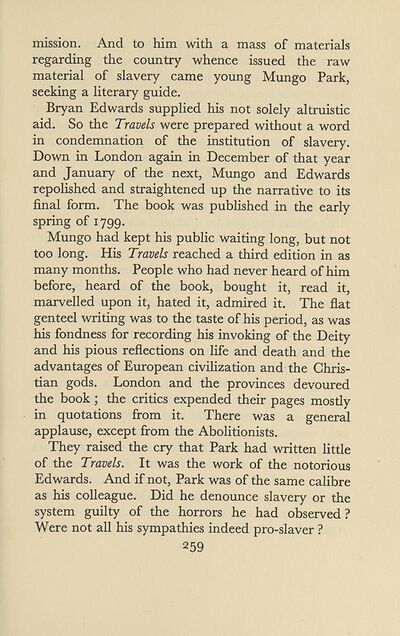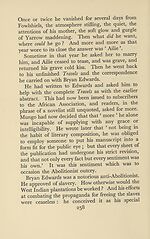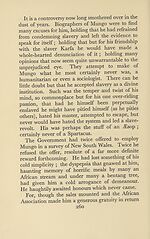Niger
(265)
Download files
Complete book:
Individual page:
Thumbnail gallery: Grid view | List view

mission. And to him with a mass of materials
regarding the country whence issued the raw
material of slavery came young Mungo Park,
seeking a literary guide.
Bryan Edwards supplied his not solely altruistic
aid. So the Travels were prepared without a word
in condemnation of the institution of slavery.
Down in London again in December of that year
and January of the next, Mungo and Edwards
repolished and straightened up the narrative to its
final form. The book was published in the early
spring of 1799.
Mungo had kept his public waiting long, but not
too long. His Travels reached a third edition in as
many months. People who had never heard of him
before, heard of the book, bought it, read it,
marvelled upon it, hated it, admired it. The flat
genteel writing was to the taste of his period, as was
his fondness for recording his invoking of the Deity
and his pious reflections on life and death and the
advantages of European civilization and the Chris¬
tian gods. London and the provinces devoured
the book ; the critics expended their pages mostly
in quotations from it. There was a general
applause, except from the Abolitionists.
They raised the cry that Park had written little
of the Travels. It was the work of the notorious
Edwards. And if not, Park was of the same calibre
as his colleague. Did he denounce slavery or the
system guilty of the horrors he had observed ?
Were not all his sympathies indeed pro-slaver ?
259
regarding the country whence issued the raw
material of slavery came young Mungo Park,
seeking a literary guide.
Bryan Edwards supplied his not solely altruistic
aid. So the Travels were prepared without a word
in condemnation of the institution of slavery.
Down in London again in December of that year
and January of the next, Mungo and Edwards
repolished and straightened up the narrative to its
final form. The book was published in the early
spring of 1799.
Mungo had kept his public waiting long, but not
too long. His Travels reached a third edition in as
many months. People who had never heard of him
before, heard of the book, bought it, read it,
marvelled upon it, hated it, admired it. The flat
genteel writing was to the taste of his period, as was
his fondness for recording his invoking of the Deity
and his pious reflections on life and death and the
advantages of European civilization and the Chris¬
tian gods. London and the provinces devoured
the book ; the critics expended their pages mostly
in quotations from it. There was a general
applause, except from the Abolitionists.
They raised the cry that Park had written little
of the Travels. It was the work of the notorious
Edwards. And if not, Park was of the same calibre
as his colleague. Did he denounce slavery or the
system guilty of the horrors he had observed ?
Were not all his sympathies indeed pro-slaver ?
259
Set display mode to:
![]() Universal Viewer |
Universal Viewer | ![]() Mirador |
Large image | Transcription
Mirador |
Large image | Transcription
Images and transcriptions on this page, including medium image downloads, may be used under the Creative Commons Attribution 4.0 International Licence unless otherwise stated. ![]()
| The books of Lewis Grassic Gibbon > Niger > (265) |
|---|
| Permanent URL | https://digital.nls.uk/205177715 |
|---|
| Description | Sixteen books written by Lewis Grassic Gibbon (1901-1935), regarded as the most important Scottish prose writer of the early 20th century. All were published in the last seven years of his life, mostly under his real name, James Leslie Mitchell. They include two works of science fiction, non-fiction works on exploration, short stories set in Egypt, a novel about Spartacus, and the classic 'Scots Quair' trilogy which includes 'Sunset Song'. Mitchell's first book 'Hanno, or the future of exploration' (1928) is rare and has never been republished. |
|---|---|
| Additional NLS resources: |
|

